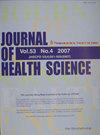Effects of Citrulline Malate Supplementation on Aerobic and Muscular Endurance in Young Adults Men
引用次数: 0
Abstract
AbstractThe aim of this study was to evaluate the effects of citrulline malate (CIT) supplementation on aerobic and muscular endurance in young adult males. Eighteen young adult men (age: 21.5 ± 2.7 years) were randomized into two groups (Citrulline malate - CIT and Placebo - PLA; N = 9/group ) and received the respective supplements for 7 days. The CIT group was supplemented with 6 g CIT + 6 g dextrose (total: 12 g), while the PLA group received the same amount (12 g) of dextrose. At the pre- and post-supplementation, the following variables were analyzed: aerobic (maximal treadmill test, Tmax) and muscle (repetitions maximum test, Rmax) endurance tests, as well as mean and maximum heart rate (HR) in Tmax and ratings of perceived exertion (PSE) in Rmax. No significant (P > 0.05) differences were found between CIT and PLA groups in time until exhaustion in Tmax, total repetitions in Rmax, maximal HR and PSE from pre- to post-supplementation. The mean HR was statistically lower (P < 0.05) in the CIT group compared to the PLA in the Tmax. In conclusion, supplementation of CIT (6 g / day) does not improve aerobic and muscular endurance, as well as maximal HR or PSE in healthy young adults, despite reducing the mean HR during the maximal incremental test. Keywords: Endurance Training. Dietary Supplements. Physical Functional Performance. Citrulline. Nitric Oxide. ResumoO objetivo deste estudo foi avaliar os efeitos da suplementacao de citrulina malato (CIT) sobre a resistencia aerobica e muscular em homens adultos jovens. Em um desenho experimental randomizado, duplo-cego e controlado com placebo, dezoito homens adultos jovens (idade: 21,5 ± 2,7 anos) foram randomizados em dois grupos (Citrulina malato – CIT e Placebo – PLA; N = 9/grupo) e receberam os respectivos suplementos por um periodo de 7 dias. O grupo CIT foi suplementado com 6 g de CIT + 6 g de dextrose (total: 12 g), enquanto o grupo PLA recebeu a mesma quantidade (12 g) de dextrose. Nos momentos pre e pos suplementacao as seguintes variaveis foram analisadas: resistencia aerobia (teste incremental maximo em esteira rolante, Tmax) e muscular (teste de repeticoes maximas, Rmax), bem como a frequencia cardiaca (FC) media e maxima no Tmax e a analise da percepcao subjetiva de esforco (PSE) no Rmax. Nenhuma diferenca significante (P > 0,05) foi encontrada entre os grupos CIT e PLA no tempo ate a exaustao no Tmax, total de repeticoes no Rmax, FC maxima e PSE do momento pre para o pos suplementacao. A FC media foi estatisticamente (P < 0,05) menor no grupo CIT comparado ao PLA no Tmax. Em conclusao, a suplementacao de CIT (6 g/dia) nao melhora a resistencia aerobica e muscular, bem como a FC maxima ou PSE em adultos jovens saudaveis, apesar de reduzir a FC media durante o teste incremental maximo. Palavras-chave: Treino Aerobico. Suplementos Nutricionais. Desempenho Fisico Funcional. Citrulina. Oxido Nitrico.补充瓜氨酸苹果酸对年轻成年男性有氧和肌肉耐力的影响
摘要本研究旨在评价补充瓜氨酸苹果酸(CIT)对年轻成年男性有氧运动和肌肉耐力的影响。18名年轻成年男性(年龄:21.5±2.7岁)随机分为两组(瓜氨酸苹果酸- CIT和安慰剂- PLA;N = 9/组),分别接受7 d的补充。CIT组添加CIT 6 g +葡萄糖6 g(共12 g), PLA组添加相同量的葡萄糖12 g。在补充前后,分析了以下变量:有氧(最大跑步机测试,Tmax)和肌肉(最大重复测试,Rmax)耐力测试,以及Tmax的平均和最大心率(HR)和Rmax的感知运动评分(PSE)。CIT组和PLA组在Tmax耗尽时间、Rmax总重复次数、最大HR和PSE添加前后均无显著差异(P > 0.05)。与PLA相比,CIT组Tmax的平均HR较PLA低(P < 0.05)。综上所述,尽管在最大增量试验中降低了平均HR,但补充CIT (6 g /天)并不能改善健康年轻人的有氧耐力和肌肉耐力,以及最大HR或PSE。关键词:耐力训练;膳食补充剂。生理功能表现。瓜氨酸。一氧化氮。目的:研究成人肌肉组织中抗氧性有氧运动中补充瓜氨酸钠(CIT)的有效性。实验随机分组,双组对照,安慰剂组,成年成年人(年龄:21,5±2,7岁),随机分组,实验组(瓜瓜- CIT,安慰剂- PLA;N = 9/组,每组1例,每组7例。CIT组补充CIT 6 g +葡萄糖6 g(共12 g),而PLA组补充CIT 6 g +葡萄糖6 g(共12 g)。有氧阻力(Tmax)、肌肉(Rmax)、有氧运动(FC)、有氧运动(FC)、有氧运动(FC)、有氧运动(Tmax)、有氧运动(PSE)、有氧运动(PSE)、有氧运动(Rmax)、有氧运动(pe)、有氧运动(pe)、有氧运动(pe)、有氧运动(pe)、有氧运动(pe)。与对照组相比,CIT组与PLA组之间的差异有统计学意义(P > 0.05), CIT组与PLA组之间的差异有统计学意义(P > 0.05), CIT组与PLA组之间的差异有统计学意义(P > 0.05)。CIT组与Tmax组相比,FC介质具有统计学意义(P < 0.05)。综上所述,补充CIT (6 g/d)可提高有氧运动肌肉的有氧阻力,使其在成人运动中达到最大的FC值,在成人运动中达到最大的FC值,在降低FC值的过程中达到最大的增量。palavras - have: Treino Aerobico。Suplementos Nutricionais。Desempenho Fisico functional。Citrulina。氧化Nitrico。
本文章由计算机程序翻译,如有差异,请以英文原文为准。
求助全文
约1分钟内获得全文
求助全文

 求助内容:
求助内容: 应助结果提醒方式:
应助结果提醒方式:


